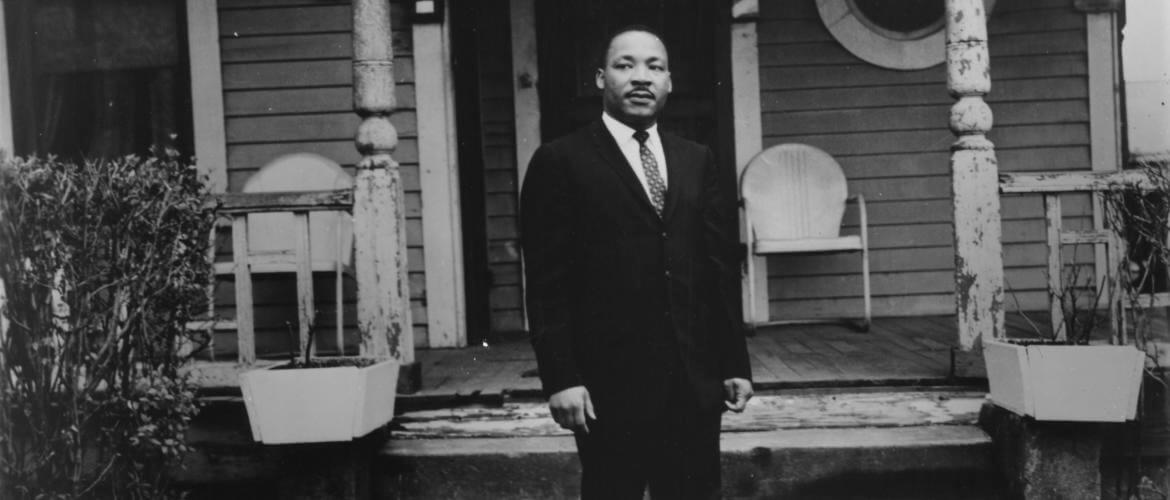
05 Apr April 5th, 1968
My hand stopped, simply stopped in mid-air. I was pulling my old Chevy into a parking space behind Lubbock High, headed for speech team practice. Oratory. Debate. Extemporaneous speech.
As I reached to turn off the radio, the news came crackling from the speakers: Dr. Martin Luther King Jr. had been assassinated in Memphis. The news stunned me, and I crumpled toward the steering wheel. My mind could not fully take it in, so my body took the blow, absorbed the impact. My heart broke, though not because the news was unexpected. We all knew that Dr. King had lived with death threats for years. His house had been bombed, after all, and he had traveled to Memphis to stand with and stand for sanitation workers. He was planning a major protest action in Washington, the Poor People’s March. Still and all, the news came in that moment, no longer speculation but truth, and now a nation had to deal with it, on April 4th, 1968.
It was April 5th, though, when the lessons Dr. King had lived to teach and had died carrying out actually came home to me.
Home, where I grew up, was Lubbock, a mid-sized city on the high dry plains of West Texas. It was the 1960’s, a liberal time in a conservative place. People were friendly but quick to settle disputes with fistfights or even guns. Football, hard core, gung ho, hurt your opponent as badly as you can football, was king. By the ninth grade, I knew there had to be a better way.
My older brother introduced me to the writings of Dr. King, and I came to a deep and abiding respect for the civil rights leader, for his oratory, his leadership, and his commitment to non-violence.
On April 5th, in the cafeteria of Lubbock High School, at lunch time, I learned hard lessons about such commitments.
I sat down to eat with guys I knew, friends who ate lunch, went to class, played ball, and hung out together. Dr. King’s death, and the ensuing riots in cities such as Chicago and Kansas City, Baltimore and Washington, D.C., were the primary topic of conversation.
Opinions were thick that day, and the guys at the table knew how I felt and understood my grief. Yet one friend, let’s call him Paul, who was quite likely repeating something he had heard at home, made a truly callous, insensitive remark about Dr. King’s death, saying that, “He got what he deserved.”
In a heartbeat, my commitment to non-violence vanished.
I lashed out verbally at Paul with angry words and a lacerating voice, and as I did I knew just as quickly that I was wrong.
I had failed Dr. King. All of my supposed devotion to Martin and his message had crumbled beneath the weight of my wrath.
Luckily, a good friend at the table called me out, pointed out the error of my ways, helped calm me. I apologized to Paul, and we remained friends, but I felt a deep shame.
It was merely an outburst, merely a raised voice and harsh words. No punches nor physical violence were involved.
Still, it was violence. I lost control and lashed out at a fellow human being.
Is that too high a standard? Is physical violence the only kind that counts?
Over the 50 years since, I have wondered if I would have continued my study of Mahatma Gandhi, Dr. King, and non-violence if I had not committed that act.
Perhaps that day caused me to understand more fully the chambers and challenges of the human heart, caused me to know that non-violence is not only about marches and protests and momentous speeches made from the steps of the Lincoln Memorial but also about the cafeteria of Lubbock High School.
Years later, in 1985, I traveled to India and visited the ashrams where Gandhi lived and developed his tenets of non-violence. One year later, in January 1986, I had the opportunity to travel to Atlanta and co-produce for PBS and the Dr. Martin Luther King, Jr. Center for Non-Violent Social Change a documentary about his life. It was the first celebration of his birthday as a national holiday, and it seemed that the world came to Atlanta.
We met and interviewed Coretta Scott King, all of the King children, John Lewis, Dick Gregory, Jimmy Carter, Andy Young, James Orange, Hosea Williams, Bishop Tutu, Julian Bond, and Ralph David Abernathy, to name some of the leading lights.
It was called, “In Remembrance of Martin,” and was described by Coretta at its premier in Atlanta as the best documentary ever made about her late husband. It aired on primetime PBS with AT&T as our national sponsor and WNET as our host station.
For me it was perhaps both a healing project and a learning experience, providing nuance and deeper understanding. I met people who never lost their passion nor their righteous anger. They simply learned how to channel those energies into positive social change, to take the steps that go beyond the march.
I know that some young activists today eschew non-violence, especially as injustice and grinding poverty seem intractable.
Be careful going down that path, the one that leads to violence. Gandhi taught that an eye for an eye leaves the whole world blind. And Dr. King studied Gandhi.
The human organism, and the heart that pumps life blood to it, is capable of ascending to great heights and of descending, willingly, into the abyss.
If violence is a manifestation of human failure to find solutions through reason and compassion, then must we not embrace non-violence as a means of moving humanity forward?
We are capable of all things. And I, the 17-year-old then and the 67-year-old now, I know what humanity is capable of. I know it all too well.




No Comments